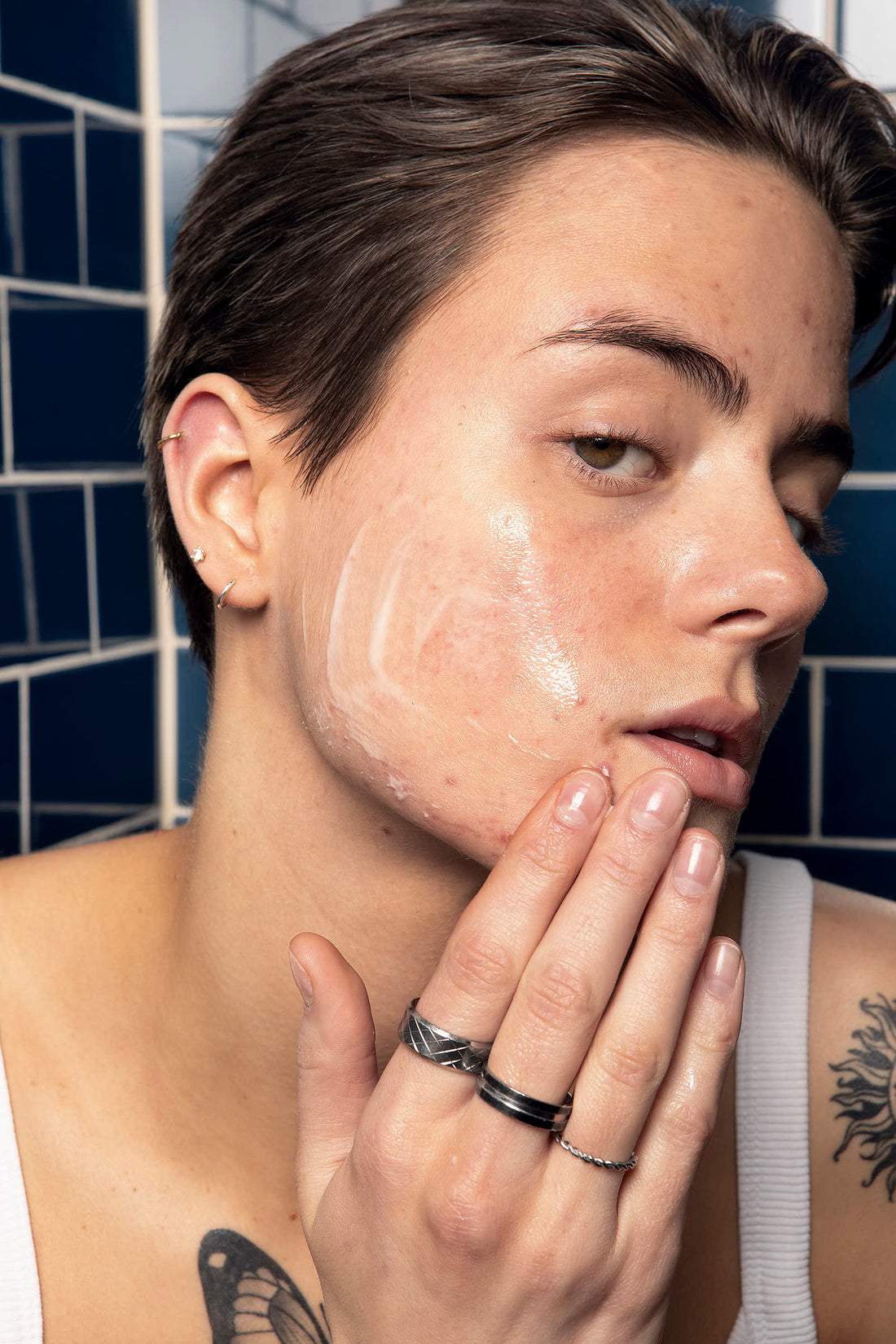June is Acne Awareness Month, which gives us the opportunity to draw attention to one of the world's most common skin conditions.

By Emma Stenman, Certified Skin Therapist
Acne Awareness Month is the ideal time to educate, clear up myths misconceptions, share information about causes and solutions, and provide guidance on how to manage this often emotionally distressing condition. For us at Common Clouds, removing the stigma around acne and addressing the skin and mental health connection is at the core of everything we do.
In this blog post, our skin therapist Emma answers some common questions about acne.
What exactly is acne?
Acne - or pimples - is actually an inflammation of the sebaceous glands that shows up as a variety of breakouts. The condition is linked to high sebum production, and acne generally affects the face, back or chest, where the largest and most active sebaceous glands are located.
Acne is most common in adolescence, when sex hormone levels rise in the body and sebum production increases. It is estimated that up to half of all adolescents have problems with acne!
Some continue to have problems later in life.
Acne is caused by the sebaceous gland's exit duct becoming blocked by sebum and keratin. The sebum then becomes trapped has nowhere to go. Bacterial growth inside the duct leads to inflammatory nodules or small pimples.
With unlimited access to nutrients, the acne bacteria lives happily ever after and can multiply at a rapid rate. The problem is that the large amounts of fatty acids that are produced irritate the skin, causing the already strained follicle wall to rupture.
The result is inflammation of the surrounding tissue, with breakouts, scarring and sometimes larger cysts. These can extend into the connective tissue and leave scars as they heal.
Why do I get acne?
Why do some people get pimples and others don't? Genetic factors play a role here. But for a hereditary predisposition to acne to take hold, some hormonal influence is also required, especially by male sex hormones, known as androgens. Androgens contribute both to increased sebum production and to the formation of keratin, which clogs the sebaceous gland ducts.
During puberty, the production of androgens increases in both boys and girls, which is why many people have problems with acne at this time. It is important to realise that pimples are not a symptom of any hormonal disorder, but only of a genetic susceptibility to normal hormonal influences.
Even as adults, many women experience occasional problems with acne around their monthly periods. Birth control pills containing female sex hormones such as oestrogen and progesterone can relieve acne. It has been found that stopping the pill can cause acne to return.
Acne can be triggered or aggravated by various factors, including certain medications (e.g. cortisone and anabolic steroids). Cosmetics can also play a role, especially greasy creams and oils that clog pores (comedogenic products). Constant picking or scratching creates a mechanical stress that often aggravates the rash. Squeezing the lesions also risks spreading the inflammation. Hot and humid environments can also affect and cause so-called Mallorca acne.
How do I treat acne?
Depending on the type of acne you have, there are different approaches:
- Medication – This is usually a good way to go when you have tried other methods or you have such a widespread area and nothing else helps. Contact your doctor or a dermatologist to discuss options.
- Skincare – Use kind and gentle skincare, and stay clear too active products that might damage your skin barrier. Focus on cleanse, treat and moisturising the skin. All of Common Clouds products are formulated to support acne-prone, sensitive skin and to maintain and strengthen the skin barrier for long-term skin health.
- Use products that are for acne – People with severe acne should always be advised to see a dermatologist for assessment. Acne has been considered very difficult to treat in the past, but can now be successfully treated with synthetic substances similar to vitamin A, known as retinoids. These preparations are generally available only on prescription.
Lifestyle factors like diet and managing stress levels can also be helpful. Here's a blog post with many tips that can help if you're struggling with acne.
During the summer you may experience more breakouts, read my blog post "How to get rid of summer breakouts" to get more insights and understanding about how you can prevent and treat your skin from breakouts!
Acne can be very mentally challenging, and if you're showing signs of anxiety, depression or a social isolation, don't hesitate to seek professional, medical help. But remember that you are not alone – acne is very common, and like clouds it will eventually pass. That's why we're called Common Clouds!
READ MORE ABOUT ACNE:
Acne and diet – How lifestyle factors can affect the skin
Why do I get acne? – Dermatologist Dr Anahita Ghorbani answers comom questons about acne
